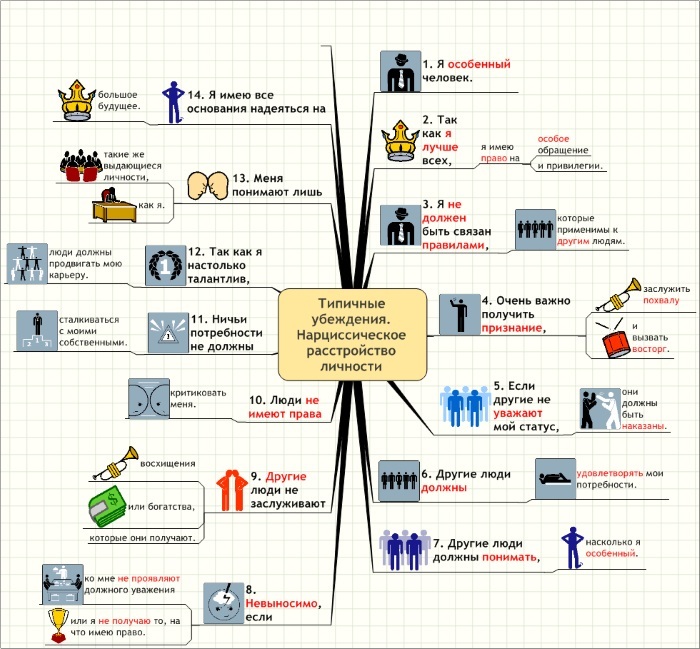Narcissistic personality disorder or narcissism is a pathology based on the belief in one's uniqueness, superiority over other people. People with this disorder are often considered narcissistic because they often talk about themselves, their success, and their beauty.
Record content:
- 1 Views
- 2 Stages and degrees
- 3 Symptoms
- 4 Reasons for the appearance
- 5 Diagnostics
- 6 When to see a doctor
-
7 Treatment methods
- 7.1 Medications
-
7.2 Folk methods
- 7.2.1 Chamomile decoction
- 7.2.2 Mint and lemon balm tea
- 7.2.3 Soothing baths
- 7.3 Psychocorrection
- 8 Possible complications
- 9 Narcissism videos
Views
There are several types of narcissism that can be combined with each other:
| "Thin-skinned" or "depressive" | People with this type of deviation are characterized by hypochondriacalism, a strong sensitivity to insults, criticism, and refusals. They resemble melancholic people. |
| "Thick-skinned" or "arrogant" | This type of narcissism is characterized by aggression towards others, arrogant behavior and the inability to realize what the patient is doing unpleasantly to others by his words or actions. |
| Unscrupulous | Unscrupulous narcissists are dishonest, immoral, manipulative people. They are characterized by dominance over others, if someone shows an unwillingness to obey them, then narcissists behave aggressively. |
| Amorous | Such people love to seduce and tease others at the expense of their own charm, but at the same time they are not prone to real intimacy. |
| Compensatory | People with a compensatory type of narcissism are characterized by low self-esteem, dissatisfaction with their own lives, which they compensate for through praise and compliments from other people. These people strive to do everything only for the sake of approval and admiration. |
| Elitist or elitist | Elitist narcissists consider themselves to be the "elite", create an image of an ideal life around themselves and want only a good attitude towards themselves, so that they are all respected and treated with servility. Often this type of narcissism occurs in people who were treated as “princes” and “princesses” in childhood. |
| Normal | Normal narcissists are capable of dating. They are characterized by sympathy, combined with great self-confidence, arrogance. They make good and capable leaders. |
| Open (pretentious) | Open-minded narcissists tend to praise themselves too much, if there is no reason for this, then they try to belittle others. They often require increased attention to themselves. |
| Closed | People with a closed type of narcissism often grow up in families where the child's success was belittled or not noticed, where it was necessary to “earn” love. In most cases, they have low self-esteem and create for themselves a certain image of a person whom they could idealize and try to adhere to this image. The behavior of such people is passive-aggressive - they can make promises, but not fulfill them, they also tend to have different models of behavior depending on the environment. |
| Toxic | Toxic narcissists not only expect admiration, they also expect others to obey them. They like to be a source of inspiration for someone, while they want to keep the “victim” near them and subdue them. |
Stages and degrees
In psychology, there are no clear stages in the development of narcissistic disorder. It is believed that this pathology in many cases is laid even in childhood due to various reasons that affect the psyche of the child.
Later, with age, personality disorder begins to progress due to changes in self-esteem - it either decreases and the person tries to compensate this is due to his “inflated” ego, or, on the contrary, self-esteem grows, because of which a person becomes too confident in his uniqueness, beauty, skills.
Symptoms
Narcissistic personality disorder is a disorder that is often mistaken for personality traits. However, it is important to notice the signs of the disorder in time in order to make life easier for the person.
The main signs of narcissism are:
- Feeling of your own high significance and uniqueness. A person considers himself to be knowledgeable, often says that he is wonderful, that they need to be proud. If the narcissist does not have his own merits, he begins to talk about the successes of his acquaintances, emphasizing that he is familiar with these people.
- Feeling right. Narcissists are incapable of perceiving their mistakes and wrongness, so it is very difficult to argue with them. In their opinion, the only correct opinion is only theirs.
-
Intense feelings of envy. Narcissists are often very envious of others and believe that everyone is jealous of them too. In the first case, they compensate for their own envy by seeking admiration from others, which is where the second case of envy appears.

Signs of Narcissistic Personality Disorder - Dependence on the opinions of others. Narcissists always think about what others think of them and try to please everyone. They react painfully and sometimes aggressively to negative assessments or criticism.
- Regular conversations about yourself. During a conversation, narcissists often try to draw the interlocutor's attention to themselves - to their views, appearance, success, deeds.
- Excessive enthusiasm for their own appearance. This is typical not only for daffodil girls, but also for men. They often look in the mirror, noticing how gorgeous they are (not just cute and pretty). Daffodils spend quite a long time in front of the mirror, trying to make their appearance even more beautiful.
- Exploitative behavior. In many cases, narcissists feel they owe everything and use other people to achieve their own goals.
Narcissists are almost always devoid of empathy, devalue the feelings and emotions of other people. In quarrels, they tend to shift the blame from themselves to another person.
Like sociopaths, narcissists are almost incapable of forming lasting contacts with other people (with a few exceptions). Also, a person with narcissistic personality disorder likes to fantasize about success, fame, wealth, and admiration.
Reasons for the appearance
Most cases of narcissism are associated with the characteristics of the upbringing of the personality in childhood and adolescence.
The following factors contribute to the development of this deviation:
- excessive admiration for the child and his actions for no reason;
- permissiveness for the child;
- over-praise for success and over-criticism for no success or bad behavior;
- praise solely for success;
- complete lack of parental approval during childhood;
- indifferent and “cold” attitude of parents to the child;
- manipulative behavior model on the part of parents;
- “Narcissistic trauma” - when a child in childhood is often belittled and criticized, as a result of which he has a strong sense of shame, his own inferiority; as a result of this, the child, as he grows up, inspires himself that he is unique and seeks to find the admiration of others.
Narcissistic personality disorder (this deviation in most cases is laid in childhood, but in adulthood, reasons may arise, leading to it) is often found in people who were the only and long-awaited child in a family with mature parents - in this case, due to long attempts to get pregnant and give birth, parents pay too much attention to the child, overprotection appears, which can lead to narcissistic personality disorder.
Sometimes a person acquires signs of narcissism in adulthood - due to great success in school, sports, work. When a person begins to feel successful and fame, then he has a sense of self-importance.
The causes of the development of this disorder can be congenital - studies have shown that narcissists decreased volume of gray matter in the part of the brain responsible for the ability to empathize, regulate emotions. From a psychological point of view, the development of narcissism can be influenced by a melancholic type of temperament, high emotional sensitivity.
In rare cases, narcissism can be the result of other mental disorders: schizophrenia, sociopathy.
Diagnostics
Narcissistic personality disorder is diagnosed by a psychotherapist. He conducts a conversation with the patient regarding his relationship with others, lifestyle, self-esteem. Also, the doctor pays attention to the behavior, speech, gestures, facial expressions of the patient.
Narcissistic personality disorder is not a disease, but a mental disorder. It is determined in the presence of 5 or more of the above signs. In addition, the patient is offered to undergo various tests to help improve the accuracy of the diagnosis and identify any other mental abnormalities.
It is also important to carry out differential diagnostics in order to distinguish narcissism from other diseases:
-
Bipolar disorder - people with this diagnosis often have depression. However, the patient's need to rise above others helps distinguish narcissism from bipolar disorder.

- Antisocial (sociopathic) personality disorder - in both cases, the use of other people for personal purposes is characteristic. But in sociopathy, a person exploits others for personal material gain, and in narcissism, to maintain his own self-esteem.
- Hysterical personality disorder - characterized by the search for attention, manipulation. But a person with narcissism is distinguished by a desire to be admired, while people with a hysterical disorder want exclusively attention on their own person, to be pitied.
When to see a doctor
People with narcissistic personality disorder in most cases do not realize that they have a disorder, considering its signs to be their own characteristics. If the narcissist receives admiration from others, he does not want to change anything, since everything suits him. If someone tries to prove to them that they have any deviations, then he meets with aggression.
If there are signs of narcissism in a loved one, it is important to discuss this with him in a gentle, polite manner and advise him to see a therapist. If a teenager has signs of deviation, then you should not rush to see a specialist - this may be due to the growing up of the personality.
But if an adult behaves in accordance with the above symptoms, then this is a signal to visit a psychotherapist.
In rare cases, a person may become aware of any problems in his behavior and relationships with others, so he himself turns to a psychologist or psychotherapist.
Treatment methods
Narcissistic personality disorder cannot be cured, but its manifestations can be reduced. Therapy is also aimed at socializing a person in society, improving relations with others, eliminating the consequences of childhood traumas and the causes of rejection. For this, medicines, herbal medicine and psychotherapy are used.
Medications
For the treatment of narcissism, complex drug treatment is used, which includes the following drugs:
-
Mood stabilizers or stabilizers ("Clozapine", "Verapamil", "Carbamazepine") - psychotropic drugs, the action of which is aimed at stabilizing mood, eliminating aggression, irascibility and impulsivity.

- Antidepressants (“Desipramine”, “Pyrazidol”) - in case of narcissistic personality disorder, they are used to treat latent depressions and improve mood.
- Sedativesa - to eliminate aggression and irascibility during seizures.
The choice of drugs depends on the condition of the patient, his age, the type of deviation. In some cases, drug therapy is skipped.
Folk methods
With narcissism, folk methods are almost never used. The only things that a person with a narcissistic disorder can take are soothing herbal decoctions that will help reduce the severity of aggression towards others, calm the nervous system.
Chamomile decoction
The broth is prepared as follows:
- 2 tbsp. l. dry chamomile flowers, pour 300 ml of hot water and put the mixture on fire.
- Bring the water to a boil, then reduce the heat and simmer the broth for another 10-12 minutes. under the lid.
- Next, the broth must be removed from the heat and cooled, then strain.
You need to take chamomile broth 100 ml 3 times a day after meals for a course of 2 weeks.
Mint and lemon balm tea
Mint and lemon balm are very sedative when consumed in moderation. To make tea, you will need 0.5 tsp. l. dry mint and lemon balm leaves - they need to be poured with 250 ml of hot water and insisted for 15 minutes. Then the tea should be filtered and drunk.

It is recommended to drink this tea before bedtime. In the morning, the dosage of raw materials should be doubled in order for the tea to have a tonic effect.
Soothing baths
Herbal baths help to relax and eliminate mental stress. For procedures, you can use such plants as: chamomile, lavender, St. John's wort, thyme. Before use, you must consult a doctor to avoid side effects.
Psychocorrection
In the psychotherapeutic correction of narcissism, the main emphasis is on the patient's understanding that all his problems are internal, and the people around him are not to blame for his behavior.
The difficulty lies in the fact that a person with narcissism is almost unable to independently ask for help due to the desire to look perfect. Therefore, the process of reaching an understanding between the doctor and the patients is rather lengthy and requires a lot of patience on the part of the treating specialist.
There are 6 types of psychotherapy for narcissistic personality disorder:
- Psychoanalytic. It is aimed at finding and analyzing the conscious and unconscious reasons for the development of a narcissistic personality disorder.
- System-relational. It involves working not only with the patient, but also with his family in order to build relationships. The therapist helps the person with narcissism develop healthier attitudes towards family members and help the patient's relatives understand the reasons for the development of the deviation, the model of behavior and communication with such human.
-
Cognitive-behavioral. Based on the search, study and subsequent correction of patterns of thinking and behavior characteristic of narcissistic disorder. Cognitive behavioral therapy is effective in that, because of his need for praise, the patient allows the therapist to correct his behavior. This method includes dialectical behavioral therapy (combining individual and group counseling) and systemic training in emotional predictability.

- Mentalization. Mentalization as a method of psychotherapy is based on the ability of people to reflect, understand and analyze their own state of mind and the state of mind of others. Through the practice, the patient learns to quickly and effectively regulate his emotions, to understand how his actions and emotions affect various problems and relationships with others and loved ones. In the course of therapy, the patient learns compassion and empathy for others.
- Scheme oriented. This type of therapy includes several methods of psychocorrection. It consists in searching for various models of behavior, feelings, images developed in childhood and leading to the development of narcissism, and replacing them with new ones. Thus, a second "education" occurs, which contributes to the establishment of a trusting relationship between the doctor and the patient. Therapy takes place in 3 stages: the search for the schemes developed in childhood, then the analysis of their manifestation in everyday life and the replacement of negative feelings and emotions with positive ones.
- Focus shift psychotherapy. During the application of this method of psychocorrection, the main attention is paid to the interaction of the therapist and the patient. The doctor asks various questions and helps the patient to analyze the manifest reactions in the present time. For example, if a patient suddenly becomes aggressive and hostile, the doctor asks him if he felt he changes in his behavior and emotions and asks to reflect on how the patient perceived himself and the doctor at that moment. The goal of this type of therapy is to create a more stable and realistic perception of oneself and other individuals.
The choice of a specific method depends on the form of the narcissistic disorder, the age of the patient, and his desire to change something.
Possible complications
Narcissistic personality disorder is a serious disorder that primarily results in a person's antisocialization.
His relations with his family and people around him are deteriorating, he cannot make love relationships and friends because of his characteristics. Increased conflict and aggressiveness can lead to quarrels and even fights, which entails physical damage to health.
Also, in the absence of therapy, narcissism can lead to depressive disorders, personality disorders (borderline, paranoid, hysterical), and cause alcoholism and drug addiction.
Narcissistic personality disorder cannot be completely eliminated, but it is possible to change the patient's attitude towards others and prevent various complications. For this, it is important for a person to realize their problem and turn to a psychotherapist in time.
Narcissism videos
2 types of daffodils:



